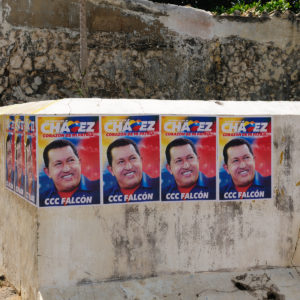“The problem with socialism,” said Margaret Thatcher, “is that you eventually run out of other people’s money,” and that eventually has come for Venezuela. Food, medicine and all of the other necessities of life are nowhere to be found.
How bad is it? A box of pasta now costs $300, and a dozen eggs goes for $150. People are even being even forced to work the nation’s farms. Everywhere else in the world this is called by its plain name: slavery. Hugo Chavez’s so-called “economic miracle” is at last stripped bare. Chavez achieved what any rational person would have thought impossible: He bankrupted the country that sits atop the world’s largest oil supply.
Chavez’s economic plan, such that it was, was hatched in 1998, when he promised a “third way” between capitalism and socialism. His idea was to take control of the oil companies and use that income to fund social programs. But Chavez made the same mistake every socialist does: He assumed that capital just falls from the sky. He gave no thought to what would happen after he confiscated the infrastructure, equipment and property that was in the hands of the oil companies, who were incentivized to maintain it.
At first, none of that mattered. Taking private property away actually works. But it only works once and only for a short while. From 2004 through 2008, Venezuela’s economy skyrocketed. Annual economic growth (in per-capita, inflation-adjusted terms) grew an astounding 11 percent annually. Poverty fell, inequality fell and socialists everywhere pointed to Chavez’s Venezuela as the model of socialism done right.
But when investors cannot profit from capital, they stop creating capital. And if it isn’t continually replaced, upgraded and maintained, capital deteriorates until the country has neither investors nor capital. Like Venezuela.
Venezuela is learning the hard way that there is no third way, because capitalism and socialism are mutually contradictory.
Prior to Chavez’s rise to power in 1998, Venezuela ranked among the 50 percent most economically free countries in the world according to the Fraser Institute. Within three years, Venezuela had fallen into the bottom 10 percent, then to the bottom three. Since 2010, Venezuela has ranked dead last. It is the least economically free country on the planet. This is why its economy is in a shambles.
The one-time benefit of nationalizing the oil industry has played out, and all that remains is misery. The economy has made it clear that the emperor has no clothes. The governing elite in Venezuela are, of course, blaming capitalists, but there are simply no capitalists left to blame.
Venezuela got to this point by believing that politicians have the power to suspend the laws of economics. Chavez nationalized oil companies. This had the predictable effect of removing the profit incentive for oil workers and entrepreneurs to create value, and casting a pall over other major industries that feared they would be next.
That, combined with the falling price of oil, meant that Venezuela’s ability to earn U.S. dollars and purchase U.S. products declined. This led to a reduction in economic growth. As economic growth slowed, the government’s tax revenues declined, so the government started printing money. This led to inflation. With inflation, the price of food rose, angering the voters. The government responded by imposing price controls. The price controls caused food to disappear. As with oil, there was no profit in providing it.
And now, the government enslaves its own people to work on farms. Socialism, in the end, is slavery.
The only way to fix this is to reverse the initial mistake. Return ownership of capital to the people and get the government out of the economy. It’s only when people can earn and keep profits from their businesses that entrepreneurship thrives, prices fall and people have food.

